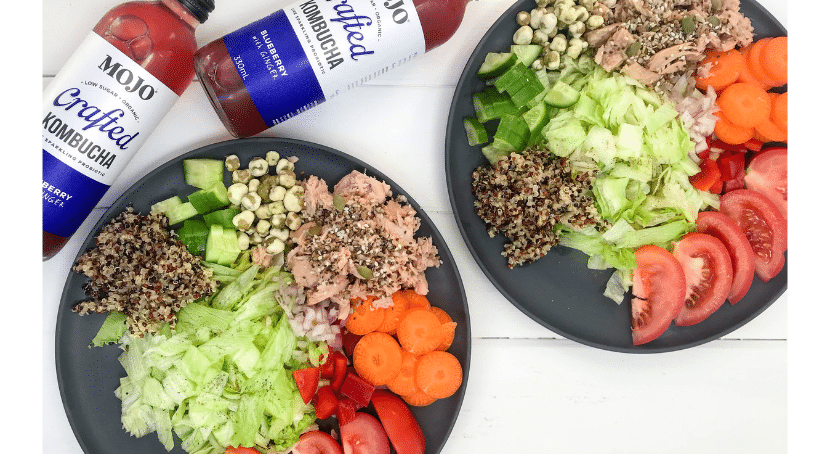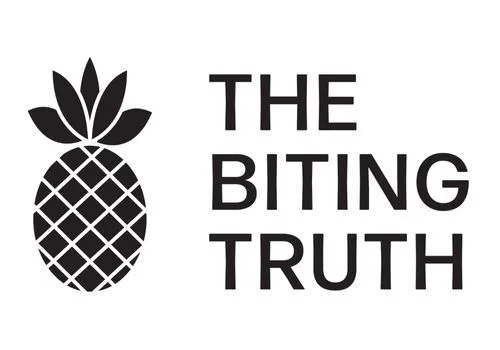
Kombucha was once seen only in hipster cafes, yet with its rapidly growing popularity, is now popping up all over the supermarket shelves. This means it’s super important to be weary of what Kombucha you are drinking to ensure it’s not loaded with sugar or other nasties and that you are reaping the probiotic health benefits!
What actually is kombucha?
Although Kombucha may seem like a fancy new health craze, Kombucha has actually been around for thousands of years. In fact, it has been consumed in China for over 2000 years and in the 1960s, Swiss scientists claimed Kombucha was beneficial for the gut.
Kombucha is a fermented tea. It is made by combing tea (green and/or black), sugar and a symbiotic culture of acetic acid (vinegar) bacteria and yeast (aka SCOBY). The SCOBY then ferments (breaks down) the sugar, which changes the polyphenols (compounds found in tea) into other organic compounds, which increases the acidity (preventing other microorganisms from growing). It is these organic compounds that are claimed to provide the health benefits beyond those already found in green or black tea.
Is kombucha a healthy choice?
Fermented foods which are made from bacteria, actually contain healthy, ‘good’ bacteria when we eat them. The theory is, these bacteria help improve our gut health, which may have a range of flow on benefits in the body, ranging from improved nutrient absorption and immunity to positive effects on mood and weight.
The problem with Kombucha, is that with its growing popularity, there are an increasing number of brands creating their own unique brews – which are not always authentic or the healthiest of options. Taking a closer look at this, the health claims associated with Kombucha do not always hold true to all brands – in fact for many, the healthy probiotics may not even survive digestion to the large intestines, where they do all their good work!
What to look for when choosing a Kombucha
Here are a some key things you can keep an eye out for when you’re looking for a Kombucha.
- Make sure it is refrigerated – Watch out for shelf-stable Kombuchas. Always choose one that is refrigerated. Cool temperatures keep the yeast and bacteria living while stopping the fermentation process.
- Check the sugar content – To make Kombucha, you always require sugar as an ingredient, as it is invovled in the fermentation process – this means the final product will always contain a small amount of product. However, because the SCOBY feeds on this sugar during fermentation there should only be a small amount left in the final product (the longer you leave it to ferment, the lower the sugar content – however if you leave it too long, it begins to taste like vinegar). Nonetheless, when it comes to commercial Kombucha, the amount of sugar can vary significantly (some companies add extra sugar to appease our sweet tooth). With this in mind it’s always good to check the nutrition label and aim for <5g sugar per 100mL. We usually recommend avoiding Kombucha that has added processed sweeteners such as stevia or erythritol – as these may compromise the fermentation process and hence the overall health benefits of the probiotics.
- Was the kombucha made from an actual SCOBY?– SCOBY stands for Symbiotic Colony of Bacteria and Yeast. Kombucha begins as a mixture of sugar and tea, before the SCOBY transforms these ingredients via fermentation into a functional health beverage! A red flag to look out for on the ingredients list is the inclusion of “kombucha extract”. This puts a question mark over how traditional the recipe is and whether the SCOBY was involved in the brewing process..
- Does the brand have any research behind the probiotics they use in their kombucha? – It’s worth having a look at the research behind the probiotic that the Kombucha claims to contain. Surprisingly there is a lack of clinical studies for the benefits of Kombucha in humans. However, there are particular strains of probiotics that have been well researched and shown to have various benefits on health. An example of a well-researched strain is Bacillus Coagulans GBI-30 6086, which you’ll find in our favorite brew, ‘Mojo Kombucha’.
- Is the alcohol content labeled? – Many Kombuchas will contain trace amounts of alcohol due to the fermentation process. In order to comply with the Australian New Zealand Food Standards, the alcohol content must be within 0.5%-1.15%.
- Are the health claims being made, too good to be true? Remember that there is no one, single food or nutrient that can cure us of all disease and provide us with optimal health. Any Kombucha that you see promising to rid you of disease amongst other things is a warning sign!
Bottom Line
It’s clear that there are health benefits to consuming Kombucha, however, with the growing Kombucha market, there is a wide variety in the products that are available. The brew that you are actually drinking and the resulting benefits to your health will vary greatly depending on the probiotic strain that is present, the fermentation time and temperature, as well as the amount and type of tea and sugar used. Our go-to Kombucha is Mojo Kombucha. This is because it is the most well-researched Kombucha on the market, it has science to back its associated health benefits, and it tastes delicious!
